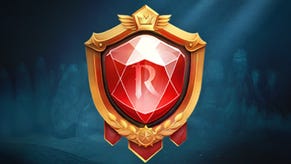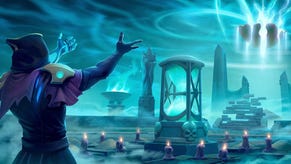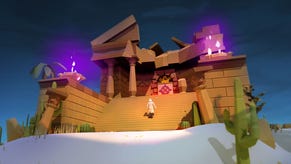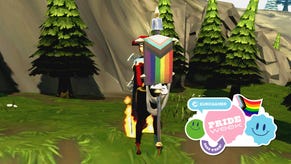RuneScape
Run! Escape!
It seemed like a nice job: to be given the opportunity to write a light-hearted piece on the first steps in the browser-based MMORPG RuneScape - an industry outsider that's quietly the Western world's second most successful MMO. Nip in, work out what everyone loves, hide my conclusions at the end of some amiable fluff, and phone my bank to tell them not to be shocked when millions of Eurogamer pounds fly into my account. I'll start with my guesses as to its popularity, then play it.
First, RuneScape is accessible. A Java-based browser application, it'll run equally happily on PC, Mac and the years-old laptop I installed Ubuntu onto for a lark. So kids can play without having to install anything, and even the most restrictive corporate networks will usually allow a nice bit of certified Java.
Secondly, RuneScape is free. Or a slice of it is. Some skills, such as thieving and agility, aren't open to guests, and the majority of quests will be denied anyone logging onto the guest servers.
Finally, RuneScape is everything that seemed amazing in 1990. A year when people would gather around a 386 processor and listen to the latest public-domain MIDI files. When children would stand in plastic tree trunks and pay 15 pounds per hour to wear a cripplingly heavy VR helmet and try to pick up an imaginary key. RuneScape has the strong whiff of the Rogue-like about it - which isn't necessarily a bad thing, when you consider how involved and deep some Rogue-likes can be.
The fact that it's so hugely popular makes RuneScape a game that demands to be taken seriously. But from the first burst of pitch-bent MIDI trumpet on the title screen, there's a worried smile on your face. A smile that you'd give a unicorn that trying to give you a neck massage. A smile that says "I appreciate what you're doing, but I'm not sure this'll work, and you really shouldn't exist".
Part One: Tutorial Island
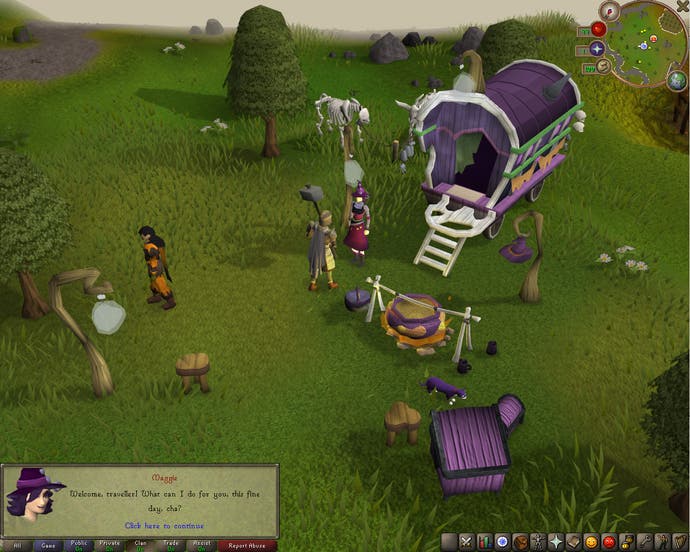
Tutorial Island is non-optional for new accounts - every player must follow the training trail. You'll be taught to chop down trees, prepare a fire from the logs, fish for shrimp, cook the shrimp, make dough from flour, and bread from dough. You'll mine tin and copper, and smelt them into bronze. You'll stab a giant rat to death, then pepper his mate with arrows. You'll pray, and be introduced to the friend and ban menus. I tried to befriend someone called "worldeater12". Not because I'd met him - more because anyone called World Eater 12 sounds like the kind of bloke you'd want to have on your side.
Virtually everything you do gives you experience. RuneScape's XP and levelling system is divided into 24 boxes (with a couple, as mentioned, only available to paying members). Cut down a tree, get 25 Woodcutting XP. Cut down just under 100 trees, and you'll be able to... cut down new kinds of tree. Fire-making is another skill, which gives you something to do with all the trees you've cut down. And on the fires, you can level your cooking skill by toasting the prawns you got from grinding your fishing skill. Eat cooked meats to top up your energy during combat, which boosts your Defence, Strength, HP and Attack experience. Do your enemy the dignity of burying his bones, and you'll get prayer experience.
There are no character stats, only bonuses to your levels acquired from items, and your overall level is calculated from all your others. With nothing that's not unlockable to any paying member, the only limitation is how much of your life you're honestly capable of spending in this world. No classes means one character per account - it makes no sense to have more than one when it would be a needless duplication of effort. This has its own drawbacks, as I'll discover later.
With a network of level prerequisites and codependencies between the ability and crafting skills, there's always something that needs to catch up. This trail of tantalisingly close numbers is pure brain-filling time-sponge. It's one thing RuneScape gets right - progress may not always be meaningful, but it's constant.




